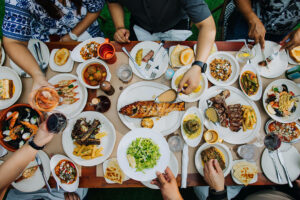CHEF Robby Goco strikes gold again with more praise for Greek cuisine — we’d say “paean” but that’s a little bit on the nose — with his new restaurant, Elaia by Cyma.
Opening just last December, the restaurant’s name comes from the Greek for “olive.” The Greeks value the plant a great deal — in a legend, Athens took its name and patronage in a contest between Poseidon, the God of the Sea, and Athena, the Goddess of Knowledge and War. Poseidon gave the city the horse; Athena, the olive. The Greeks valued the olive more, and to this day, the capital bears the name of the contest’s winner, long after the gods lost their significance.
Guests were taken to the restaurant, which is located in Silang, Cavite, just a little bit off tourist hotspot Tagaytay, on Feb. 6. Tables groaned under the sheer amount of food.
We’ll say the pita and the tzatsiki were quite mild, and the Eggplant melitzo (all of these were presented as dips for the pita bread) was smoky and vivid. There was a dish of roasted shrimp, tomatoes, and feta called Garides Saganaki, with a definite taste and feel of something carefully stewed for a long time. Mr. Goco served a panzanella, a Greek bread salad with crisp bread and a very vibrant and forward tomato flavor. We liked the Kreatopita beef pie, so oddly comforting and familiar.
We entered serious territory with an octopus stew, braised for eight hours in red wine. It was so tender it broke apart with a flick of the tongue on the palate. A pompano was hot off the grill, and was very clean-tasting, but a winner from the main courses was the Pork Belly, cooked almost like it was Filipino. Marinated in coriander root, limes, and paprika that penetrated all the way to the center, it was smoky-sweet and tasted like a seaside meal.
The Roasted Lamb also impressed us, with meat so tender it could be sliced with a spoon (to be fair, not a novelty for a Filipino).
While we complained we had no room for dessert, we still managed to finish a slice of Sokolatopita — Greek chocolate cake with brown butter buttercream and salted caramel.
Mr. Goco professes that he has lost weight despite this amount of feasting. Describing the difference between his previous Greek-style ventures, the popular chains Cyma and Souv, he describes Cyma as someone from the city, Souv as its eccentric sibling, and Elaia as their traditionalist grandmother.
“This one really promotes longevity,” he told BusinessWorld in an interview. “We really made it a point that everybody here will be having their proteins, with very, very healthy vegetables.” He added, “Everything’s cooked in extra virgin olive oil. No more seed oils.”
Some cooking guides are against the practice, singling out extra virgin olive oil’s low smoke point (which means the oil burns out and breaks down, which opens the possibility of the release of harmful compounds; not to mention the taste). He says, “It doesn’t change the oil. Yeah, sure, you’re going to see it’s smoking, but it stays longer, and it doesn’t go bad. Unlike others, wherein after the high smoke point, wala na (it’s gone), it turns rancid. Olive oil, it maintains its integrity.”
To his point, nothing we tasted was off, and we don’t know how he does it, but some dishes even tasted like they had butter in it (zero; we couldn’t believe it wasn’t butter).
Bustling Tagaytay has attracted more than its fair share of tourists and moving further away from the lake (or the Ridge) has become a solution for restaurateurs to take advantage of the location without the hassle. “It’s very calming,” he said about opening in Silang. “Once you get to the Ridge, it’s stressful.”
The location also provides a locus for supplies, thanks to the great agricultural scene: “This can service our restaurants in Manila. This is going to be the drop-off point for all the vegetables,” he said.
À LA GRECQUE (SALAD AND A WAY OF LIFE)Mr. Goco first opened Cyma in 2000, after studying Greek cuisine in Greece, and noting the dearth of proper Greek restaurants in the Philippines. It’s still standing, and even thriving. He lines out reasons why the two cuisines meld so well — for example, both are archipelagos (the name for island groups comes from the Greeks). “Both rely heavily on the sea for sustenance. Very similar.”
Frequent visits to Greece must have rubbed off on him, and may have changed him à la grecque (“in the Greek manner,” but also a way of dressing food in olive oil and lemon juice), we said. Not so much: there’s very little to modify between Greek and Filipino behaviors, apparently. “It’s very similar to the Filipino,” he said.
“They’re very expressive with their feelings. They talk loud(ly), right? The weather is almost like the Philippines. They’re very proud of their culture.”
Elaia by Cyma is on Buenavista Ave., Bucal, Silang, Cavite. It is open daily, from 11 a.m. to 8 p.m. on Mondays to Thursdays, and 11 a.m. to 9 p.m. on Friday to Sunday. For reservations, contact 0917-163-7287. — Joseph L. Garcia

